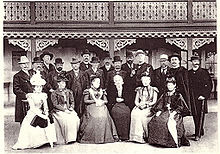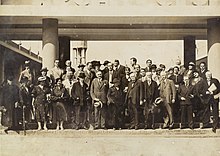 | |
| Abbreviation | IPB |
|---|---|
| Formation | 13 November 1891[1] |
| Type | NGO |
| Legal status | Nonprofit |
| Purpose | Peace activism |
| Headquarters | Berlin, Germany |
| Coordinates | 52°31′21″N 13°23′01″E / 52.522454°N 13.383641°E |
Region | Worldwide |
| Methods | Seminars and Conferences, Education, Advocation |
| Fields | World peace |
Co-president | Corazon Valdez Fabros |
Co-president | Philip Jennings |
Main organ | Assembly of the International Peace Bureau |
| Award(s) | 1910 Nobel Peace Prize |
| Website | ipb.org |


The International Peace Bureau (IPB; French: Bureau international de la paix), founded in 1891,[2] is one of the world's oldest international peace federations. The organisation was awarded the Nobel Peace Prize in 1910 for acting "as a link between the peace societies of the various countries".[3][4] In 1913, Henri La Fontaine was also awarded the Prize "[For his work as] head of the International Peace Bureau".[5][6] As of 2012[update], eleven other Nobel Peace Prize laureates have been members of the IPB.[7]
Its membership consists of 300 organizations in 70 countries.[8] IPB's headquarters are located in Berlin, Germany, with offices in Barcelona, Spain, and Geneva, Switzerland. Prior to 2017, the headquarters were in Geneva.
Its main programmes are the Global Campaign on Military Spending (GCOMS) and disarmament for sustainable development, which focuses both on nuclear and conventional weapons, as well as biological weapons, landmines, and small arms.[8][9]
IPB holds Consultative Status with the United Nations Economic and Social Council (ECOSOC) and associate status with the United Nations Department of Global Communications.[8]
IPB was founded under the name Permanent International Peace Bureau (Bureau International Permanent de la Paix). From 1912 onward it used the name International Peace Bureau. Between 1946 and 1961, it was known under the name International Liaison Committee of Organizations for Peace – ILCOP (Comité de liaison international des organisations de paix – CLIOP).
- ^ "International Peace Bureau | UIA Yearbook Profile". Union of International Associations. Retrieved 2023-03-22.
- ^ "Over a Century of Peace-Making". International Peace Bureau. Archived from the original on 2013-04-15. Retrieved 2012-02-14.
- ^ "Award Ceremony Speech (1910)". Nobel Foundation. Retrieved 2011-10-06.
- ^ "The Nobel Peace Prize 1910". Nobel Foundation. Retrieved 2011-10-06.
- ^ Lundestad, Geir (2001-03-15). "The Nobel Peace Prize, 1901–2000". Nobel Foundation. Retrieved 2011-10-06.
- ^ "The Nobel Peace Prize 1913". Nobel Foundation. Retrieved 2011-10-06.
- ^ "IPB Nobel Prize Winners". Nobel Foundation. Archived from the original on 2012-07-18. Retrieved 2011-10-06..
- ^ a b c "IPB - Who we are | IPB - International Peace Bureau". Retrieved 2020-06-22.
- ^ "Homepage". demilitarize.org. Retrieved 2020-06-22.